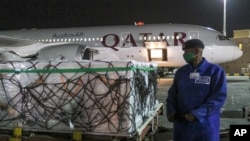Kenya received one million Oxford-AstraZeneca coronavirus vaccines Tuesday night, the first East African nation to get a shipment of the vaccines. The ministry of health said it would set aside 400,000 coronavirus jabs for the country's medical workers.
James Kamau, in his sixties, is one of the millions of Kenyans living with HIV. The father of two is excited about the COVID-19 vaccines arriving in the country.
“Given the opportunity, I will, because it's to my advantage that I take the vaccine," Kamau said. "If I took the BCG vaccine even without being asked and it still advantageous, then I don’t see the reason why not to… I am more immune-compromised than ordinary (people), so it's even more highly recommended. Yes, of course, we don’t know what side effects will be, but in my view, the benefit will outshine the side effects if there are any.”
Kenya received its first batch of the vaccines Tuesday night. Some 400,000 health workers will be given top priority, followed by the elderly and people with existing health conditions like Kamau.
Kenya has an estimated 50 million people, so one million doses is just a drop in the bucket.
Speaking to journalists after receiving the vaccines at the airport, Health Minister Mutahi Kagwe assured the country there will be more medicine arriving and there was no need to fear.
“This is only the first arrival, there will be more vaccines coming through and therefore, we don't want anybody to panic and to think that they are not going to get vaccinated," Kagwe said. "The second thing is that it's a voluntary thing, it's not a mandatory vaccination. People who want to be vaccinated will be vaccinated and we hope it will be a majority of the people.”
Kenya is one of the few African countries that have received coronavirus vaccines.
Catherine Kyobutungi is the head of the African Population and Health Research Centre. She says the biggest challenges for Africa are to get enough doses and to overcome widespread misconceptions and disinformation about the vaccines.
“But for the person on the street sometimes it's hard to distinguish between different technologies which have been used for developing the vaccines," Catherine said. "So there are some conceptions about whether it's safe, whether it was developed too fast, whether corners have been cut. But the vaccines have all gone through rigorous trials, their safety and efficacy have been established and the government have put in place the right systems to make sure they are the right thing for the country.”
Governments around the world have approved the vaccines and encouraged their citizens to get vaccinated. So far, more than 50 million people in the United States have received at least one dose of either the Pfizer or Moderna vaccines.
Kenya recorded its first case of coronavirus in March last year. So far, more than 100,000 people have contracted the virus and at least 1,000 have died.
The East African nation still has a nighttime curfew in place and banned public gatherings to limit the virus's spread.







